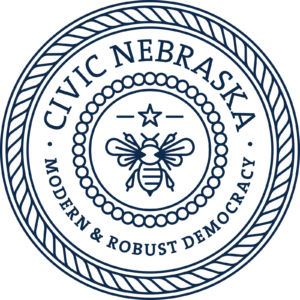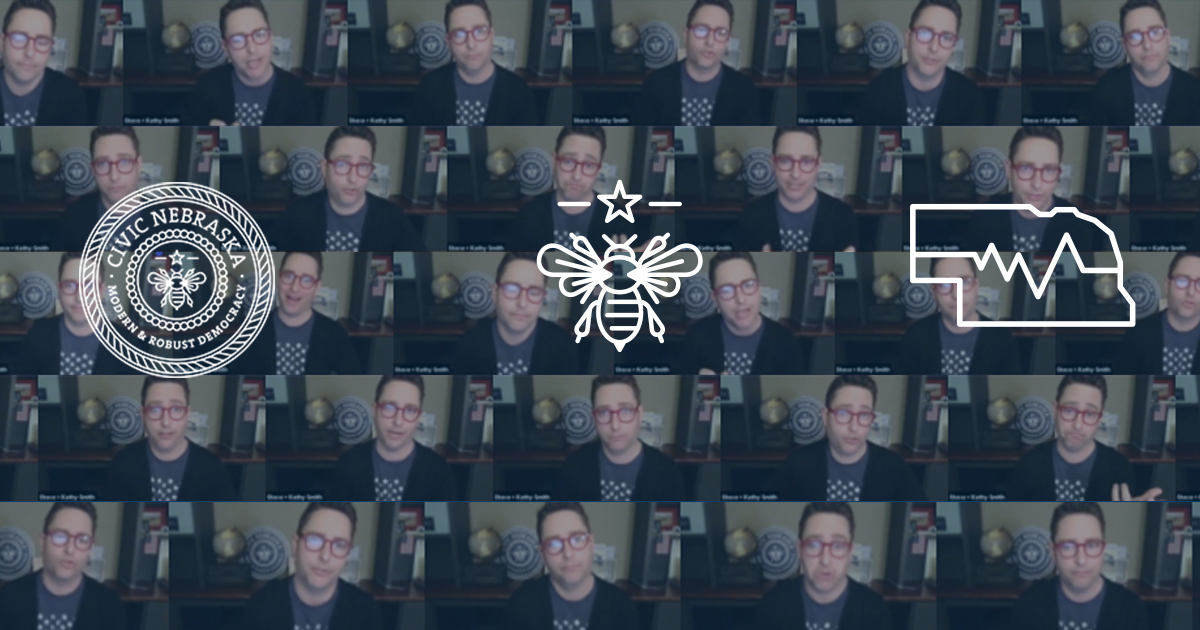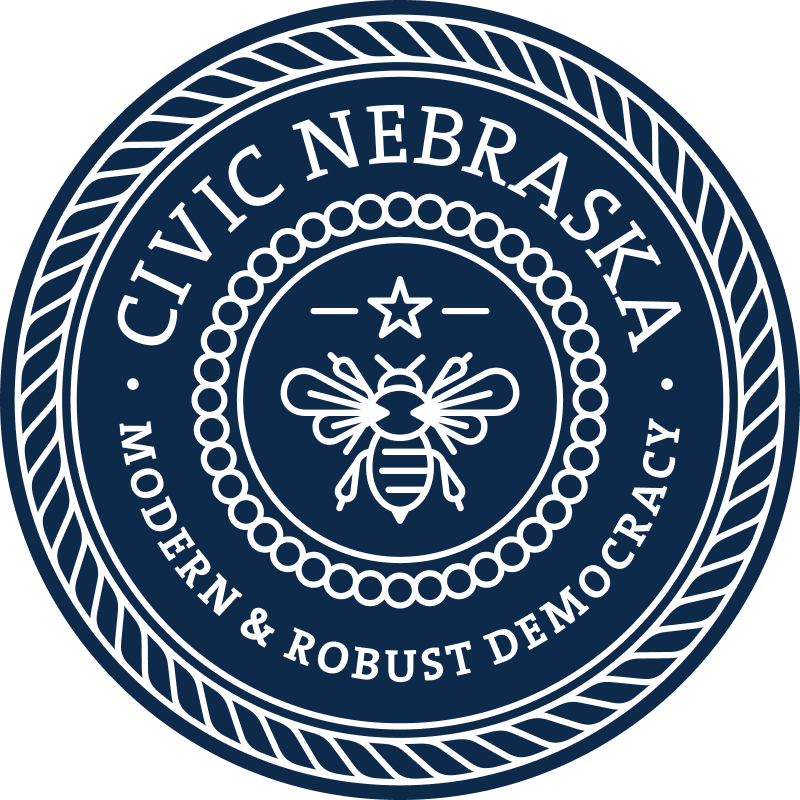On March 27, 2021, Steve Smith delivered the following ‘Civic Sermon’ during Civic Nebraska’s virtual Civic Saturday gathering. Watch the full video of the gathering here, and learn more about Civic Nebraska’s Civic Saturdays at this link.

Do me a favor as we get started. Close your eyes and picture a patriot.
What comes to you?
Maybe, your mind’s eye sees those who fought for the cause of liberty. A minuteman stopping the British at the Old North Bridge. Or, maybe, it’s a Union soldier holding the line at Gettysburg. Or Marines, lifting the flag on a rocky Pacific island.
Or, do you see other varieties of freedom fighters? Conductors on the Underground Railroad. Freedom Riders busing along Southern roadways. A preacher with a dream.
Keep ‘em closed. Let’s go further.
Can you see, perhaps, a president lifting up the nation during a crisis? Or maybe powerful, triumphant athletes in Red, White, and Blue, holding medals and World Cups aloft. Or, motorcyclists flanking the families of fallen soldiers, offering them a respite as well as the space to grieve.
What about … protestors on the public square. A lone voice standing against the drumbeat of war. Or maybe it’s very very simple, like a neighbor, lowering and folding her front-porch flag into a crisp triangle as the sun goes down.
Go ahead, now, and open your eyes.
 Interesting exercise, isn’t it? Walking through all those different categories, how our mental lenses shifted and reframed and evolved along with the decades and centuries and contours of patriotism we visited. And, each of those images is as valid as the next. Each certainly does convey a distinct aspect of our patriotism. Straightforward yet complicated. Physical yet abstract. But always steeped in American values of equality, optimism, and fairness.
Interesting exercise, isn’t it? Walking through all those different categories, how our mental lenses shifted and reframed and evolved along with the decades and centuries and contours of patriotism we visited. And, each of those images is as valid as the next. Each certainly does convey a distinct aspect of our patriotism. Straightforward yet complicated. Physical yet abstract. But always steeped in American values of equality, optimism, and fairness.
They were telling, too, in their diversity, weren’t they? Our definitions of American patriotism are wide-ranging. That’s not a shock; it’s to be expected here in the U.S. … Surveys show that, compared with the rest of the world, we spend an awful lot of time thinking about – and arguing about – what is patriotic. For example … the World Values Survey, which is the most consistent measurement of national sentiments around the world, always puts Americans at or near the top when it comes to expressing pride in our nationality.
What might be surprising, though, is that American pride is actually on the decline – at least if some domestic surveys are to be believed. Example: In 2003, an annual Gallup survey found that a full 70 percent of us were “extremely proud” to be Americans. By 2019, the number in that survey had slid to 47 percent.
Forty-Seven percent! Not even a majority.
I have lots of amateur theories on why that number is dropping. I look at it, and I think that most of all, it reflects the really complicated nature of America. Our national story is pretty extraordinary and messy. And we’ve not always been the good guy in it. We’ve struggled mightily, for generations, to really live up to those heady Founding principles.
I get it. Yet, I love my country. I love it. And I know you’re here today … because you do, too. And you have that yearning for, that calling to something greater.
So, let’s talk about patriotism. Let’s wrestle with it a bit. Let’s try to wrap our heads around what it means to us, both individually and collectively. And maybe, by the time we part ways today, we’ll have at least started a conversation about what being patriotic means in the United States of America in the year Twenty-Twenty-One, A-D.
First, though, let’s talk about the patriotism that we often settle for. Then, let’s talk about why a modern patriotism is needed. And finally, let’s talk a little about what patriotism can still be as we move forward.
OK, that first point. What we settle for.
Sorry, I’m still stuck on that 47 percent. I suppose that it’s a safe bet that some of the drop in the past twenty years is in response to how polarized our politics have become; because of the emergence of Team Red and Team Blue. In an era when not even Mr. Potato Head or Dr. Seuss can escape the smallness of our politics, it’s easy to conflate the country with our political leaders. If they’re on your side and in the majority, then you’re proud of your country. If not, then you’re not.
But that’s not really patriotism, is it? An American who holds their love of country hostage – depending on whether their Team is in power, or not – is a partisan, not a patriot. And partisans use patriotism like a cudgel, swinging it around and smashing dissent, all in service of a particular and narrow ideology. But obedience to a narrow ideology is not the same as the love of country.
 It’s also obvious that a slice of Americans clearly believe one’s patriotism can be measured by how much red, white, and blue they display. There are daily reminders of this, here in the Heartland. Three-by-five flags flapping on the backs of pickup trucks going down Highway 2. Political candidates driving through residential neighborhoods blaring Lee Greenwood. To be clear, there’s nothing inherently wrong with flags-on-trucks or liking Lee Greenwood. But if that’s where one’s love of country starts and stops – if there’s little to no purpose behind such performative behavior other than to flex – it’s hard not to see it simply as self-interest. And so, it comes off as cheap and shallow. This patriotism – like the maneuvers from elected officials in Georgia this week in terms of voting – is not built to stand the test of time.
It’s also obvious that a slice of Americans clearly believe one’s patriotism can be measured by how much red, white, and blue they display. There are daily reminders of this, here in the Heartland. Three-by-five flags flapping on the backs of pickup trucks going down Highway 2. Political candidates driving through residential neighborhoods blaring Lee Greenwood. To be clear, there’s nothing inherently wrong with flags-on-trucks or liking Lee Greenwood. But if that’s where one’s love of country starts and stops – if there’s little to no purpose behind such performative behavior other than to flex – it’s hard not to see it simply as self-interest. And so, it comes off as cheap and shallow. This patriotism – like the maneuvers from elected officials in Georgia this week in terms of voting – is not built to stand the test of time.
That said, I do have to give credit where it’s due: That empty swagger that I just described is really pervasive. In the United States of Entertainment, it’s become its own brand. And so, it can naturally drive otherwise loyal Americans to over-compensate in response. That opposite and equal reaction that can create an unintentional and unproductive dichotomy – refuting the lunk-headed idea that America can do no wrong with the lunk-headed idea that America can do no right.
We’re at a time with heavy conflicts, all putting strain on our American heart. Some of us might say – well, good – let’s crush it and start all over. And, maybe they’re right. But here’s the thing: Whatever happens next in our shared American story, patriotism matters. It’s going to have a role to play, just as it has throughout our history. So, we need to decide what kind of patriotism that’s gonna be. It can be half-baked, jingoistic, and reactionary. Or it can be something useful – something reflective, something that points us to a higher purpose … a national calling that compels us to leave this place better than we found it.
And that leads me to the second thing I want to talk about today: Why patriotism is still important, at long last.
It’s more than just having pride. Patriotism is pride with purpose. And it is an indispensable ingredient in American life, no matter who you are, where you come from, or how you vote. You’ve heard me preach on this before – but America is truly one of a kind. We Americans deeply believe our nation is built upon a unifying creed that is simultaneously unique and universal. You know what I mean: We’re the first country to successfully combine oil with water – individual liberty and collective sacrifice. We’ve blended these two things together in an American alchemy that has brought about something never before experienced in the entire history of the world.
And it would have failed long ago, had it not been for Americans before us understanding that a country doesn’t just become great. It’s taken a deep understanding of what choices we’ve made to make our nation great, and more importantly, what choices we all must make to keep us great: Choices that involve common endeavor and shared sacrifice. These everyday acts bring real meaning and mutuality to the words of the Founders.
Let’s put it this way: Our Constitution makes us free persons, but our bonds of civic affection make us a people.
So if nothing else sticks today, I hope you can come away with this: Patriotism matters. Because without it, citizenship is just value-free spadework; keeping busy for busy’s sake. Patriotism puts meaning behind our citizenship. It strengthens our social bonds. It solidifies our mutuality as Americans. It helps to shape our common purpose. And, in case I haven’t made it clear, it’s absolutely necessary as we move forward.
And, moving forward is the last thing I’d like to talk about today.
Look, this can be a hairy topic. It can stir passions, and unearth some pretty deeply-held convictions that we didn’t realize we valued so much until they were poked at. So I’m determined to not be very prescriptive. I don’t want to lay out a lot of hard-and-fast rules here. That’s a fool’s errand, given everything we’ve gone over today. Truth is, there are many, many people who consider themselves patriots. They care about this country. But they might care about it in very different ways than you or I. So rather than making endless value judgments, suffice it to say that there’s room on the spectrum for most, if not all of us, in this discussion.
Here’s what I would say: Here, in the 21st year of the 21st century, we could benefit from a little more reality-based patriotism. One that really does meet us Americans where we are and where we’ve been, and, based on those realities, one that casts an imaginative hope for the future. And this hope would come from an honest evaluation of our past and our present. So, this is a love-of-country that rejects nationalism. And it also sets aside the deception of absolute American exceptionalism. Those are narrow concepts. They’re myths.
At the same time, this reality-based patriotism also has to strengthen our relationship with our American identity, doesn’t it? That relationship can and should include questioning and doubt. But it also can and should cherish the brighter aspects of being American. We can and should find something about our country to celebrate. Again, this doesn’t mean we don’t acknowledge our sins or our flaws – and then strive to set things right – but it most certainly means allowing ourselves to be grateful and, yes, proud to be Americans.
 This is what stirs my American spirit: The fact that we are a consequential people, that make up a consequential nation. A necessary nation. That America is a unique and noble ideal made manifest; a righteous declaration of self-evident truths that pertain to all men, women and children. There is greatness in this ideal, and it has bent the arc of history. And so, I do believe we are a special people, with an essential responsibility not only to one another but to the entire world. At our best, we stand as examples of the strength of freedom and of equality. And for the values and virtues of honesty, hard work, courage, fair play, tolerance, innovation. It’s not that we have a monopoly on these things. We don’t! But when we apply them here in America, when our example of how we treat one another takes hold, we send ripples across oceans and continents and inspire untold billions to reach for that ideal that we too often take for granted.
This is what stirs my American spirit: The fact that we are a consequential people, that make up a consequential nation. A necessary nation. That America is a unique and noble ideal made manifest; a righteous declaration of self-evident truths that pertain to all men, women and children. There is greatness in this ideal, and it has bent the arc of history. And so, I do believe we are a special people, with an essential responsibility not only to one another but to the entire world. At our best, we stand as examples of the strength of freedom and of equality. And for the values and virtues of honesty, hard work, courage, fair play, tolerance, innovation. It’s not that we have a monopoly on these things. We don’t! But when we apply them here in America, when our example of how we treat one another takes hold, we send ripples across oceans and continents and inspire untold billions to reach for that ideal that we too often take for granted.
I said I wouldn’t be too prescriptive. But I’d be remiss if I didn’t say – one obvious way to be patriotic right now, to combine pride with purpose, is to get vaccinated at your first opportunity. Those who have been to the big clinics like the ones at Pinnacle Bank Arena speak unanimously of the pride that’s evident at these events. But it’s bracketed by the spirit of tackling a shared issue together. What’s happening right now is an American miracle. It’s worth celebrating as patriots – accepting this gift of science, this gift of innovation, this gift of determination not only for ourselves, but for our neighbors, our loved ones, and our nation. With each Facebook photo showing a Band-Aid on a shoulder, we individually and collectively say to one another: Take heart, friends. The end of the pandemic is in sight. And there’s nothing we can’t overcome if we own it, together.
Because – and you already know this – it’s up to us. This applies to our public health and our civic health. We’re in a fraught time for our Republic, and we need committed patriots right now. People who are grounded in love of country and well-versed in our long-held national values to help stabilize our American ship. I don’t care if you’re left, right, or otherwise – this is so much bigger than politics. It’s about remembering our American values … and acting every day on their behalf.
Patriot. Acts.
So as I come to the end of my sermon today, I sincerely hope this is a start for all of us in pondering just what realistic American patriotism looks like in the 2020s. Yes – it will appear slightly different to each of us. That’s the Unum part that balances the Pluribus. But no matter where we all fall, this much is clear: Patriotism matters.
At its best, it can be aspirational and inspirational, inclusive and exceptional. It can be honest about our glories, and our sins. It can reckon with and reflect on our national ideals as well as our essence as individuals. Our patriotism is an acknowledgment that America is far from perfect. Yet she is a significant and important nation. And as her people, we all must take on a role in her story. Each and every last one of us. Each and every day.
For our shared national future. For us, as a people. And for the rest of the world.
Please, do me a favor, now. One more time, I’d ask you to close your eyes.
Picture a patriot.
Look closely.
Do you see yourself?
![]()


